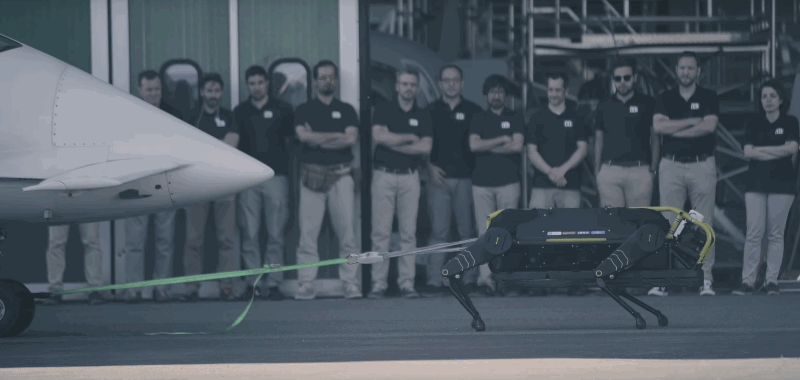It’s not really clear just yet exactly what all these powerful, agile quadrupedal robots people are working on are going to do, exactly, but even so it never gets old watching them do their thing. The latest is an Italian model called HyQReal, which demonstrates its aspiration to winning strongman competitions, among other things, by pulling an airplane behind it.
The video is the debut for HyQReal, which is the successor to HyQ, a much smaller model created years ago by the Italian Institute of Technology, and its close relations. Clearly the market, such as it is, has advanced since then, and discerning customers now want the robot equivalent of a corn-fed linebacker.
That’s certainly how HyQReal seems to be positioned; in its video, the camera lingers lovingly on its bulky titanium haunches and thick camera cage. Its low slung body recalls a bulldog rather than a cheetah or sprightly prey animal. You may think twice before kicking this one.
The robot was presented today at the International Conference on Robotics and Automation, where in a workshop (documented by IEEE Spectrum) the team described HyQReal’s many bulkinesses.
It’s about four feet long and three high, weighs 130 kilograms (around 287 pounds), of which the battery comprises 15 — enough for about two hours of duty. It’s resistant to dust and water exposure and should be able to get itself up should it fall or tip over. The robot was created in collaboration with Moog, which created special high-powered hydraulics for the purpose.
It sounds good on paper, and the robot clearly has the torque needed to pull a small passenger airplane, as you can see in the video. But that’s not really what robots like this are for — they need to generate versatility and robustness under a variety of circumstances, and the smarts to navigate a human-centric world and provide useful services.
Right now HyQReal is basically still a test bed — it needs to have all kinds of work done to make sure it will stand up under conditions that robots like Spot Mini have already aced. And engineering things like arm or cargo attachments is far from trivial. All the same it’s exciting to see competition in a space that, just a few years back, seemed totally new (and creepy).
Read Full Article

No comments:
Post a Comment